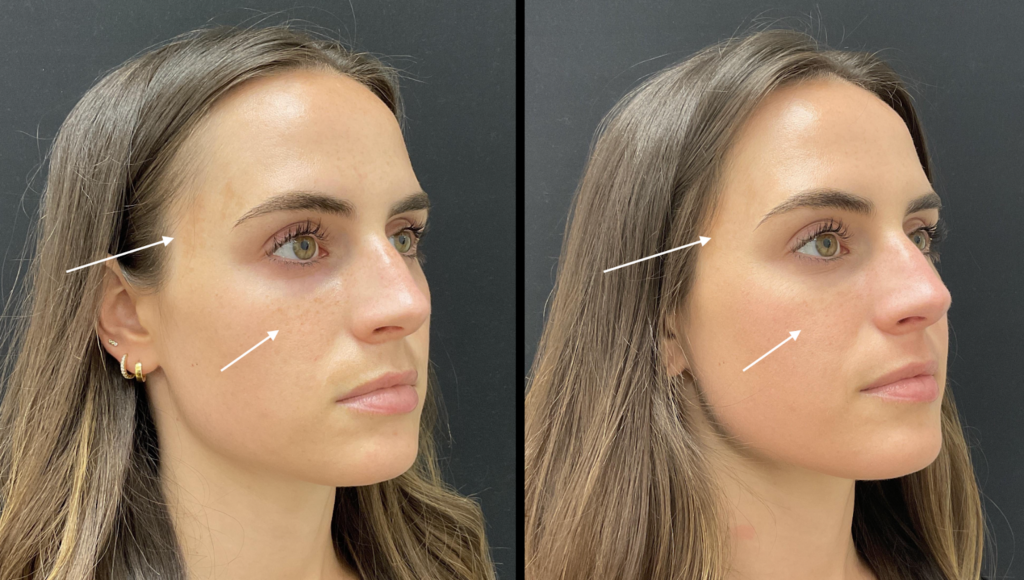Melasma is a condition that affects many women, especially those who have frequent exposure with UV rays. This skin condition is characterized by blue-gray or brown patches and is usually caused by an overproduction of melanin. This condition is generally harmless and can fade away on its own, but some cases may require treatment. It is frequently associated with excess estrogen production such as taking birth control pills or during pregnancy.

If your melasma affects your quality of life, then you may consider getting treatment. Multiple options can help you reduce the appearance of melasma, in most cases permanently. Luckily, Dr. Ostad offers these treatment opportunities, so you can control your condition. Let’s find out more!
Symptoms of Melasma
Melasma usually causes pigment and discoloration patches to appear across different areas of your skin. Most cases affect the face, causing symmetrical marks to appear on either side of your cheeks. The discoloration is often darker than your normal color and can be genetic or caused by UV rays.
For the most part, the brown patches that characterize melasma appear on your forehead, cheeks, chin, or the bridge of the nose. However, if different areas of the skin are exposed to excessive sunlight, they can also develop melasma. This includes your neck and forearms.
Treatment Options for Melasma
Several treatment options can help you reduce the severity of your melasma. In most cases, the melasma goes away on its own, but should you want to get it treated, consider the following:
1. Topical Agents
For milder cases of melasma, Dr. Ostad can prescribe a topical treatment that helps lighten your skin. As melasma is a form of hyperpigmentation, a specialized regimen set can be used to nourish your skin and brighten the pigmentation spots. While topical agents such as retinoic acid, Tretinoin, Retin A, Arbutase, and Hydroquinone can be efficient on their own, they should still be combined with other treatment methods for a better effect.
2. Chemical Peels
Chemical peels have proven to be an efficient way to treat melasma, as they exfoliate the pigmented outer layer of the skin. The treatment aims to stimulate collagen production while disrupting pigment bonds, causing the affected area to peel off.
These peels come in different strengths, so consulting with Dr. Ostad is best so that you can choose the one appropriate for your condition. If you have a mild case of melasma, then a superficial chemical peel may be able to keep your pigmented spots under control. However, a medium or deep chemical peel may be the better solution for deeper melasma.

3. Laser Treatments
Some laser treatments, such as PicoWay®, can help women and men reduce the signs of melasma. The laser creates micro-injuries in the skin, disrupting the pigment bonds and starting a cell renewal process. As your body’s healing system is activated, your lymphatic system will gradually remove the damaged cells, resulting in a more even skin tone.
Who Should Get Melasma Treatment?
Anyone who exhibits melasma symptoms should receive access to treatment. You should consider getting an appointment if you notice brown spots on your skin. Melasma is more prevalent in patients with darker skin tones due to their high melanin production.
However, patients with dark skin should be careful when getting laser treatments. Intense lasers can cause more injury, which may worsen your condition. Instead, they should go for gentle lasers like non-ablative fractional lasers. Again, a thorough consultation with Dr. Ostad will help determine the right course of action for your skin and your goals.
Treat Your Melasma!
Usually, melasma is harmless, but it can make you feel self-conscious enough to affect your social life. Luckily, you can get it treated. Call Dr. Ostad and set up an appointment for a melasma treatment!
For more information about melasma and how to treat it, contact Dr. Ariel Ostad, MD, at 212-517-7900. He would be more than happy to offer you guidance so that you can choose the right treatment option. Alternatively, you can fill out our online contact form, and we will get in touch with you as soon as possible.
Schedule a
Consultation
Consultation
By submitting this form you agree to be contacted via phone/text/email.
 897 Lexington Ave. New York, NY 10065
897 Lexington Ave. New York, NY 10065 212-517-7900
212-517-7900